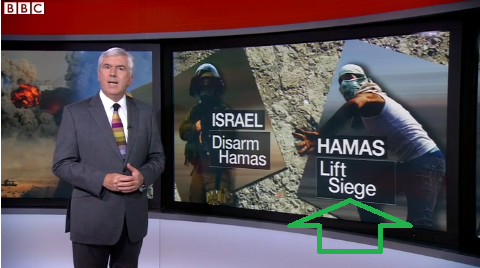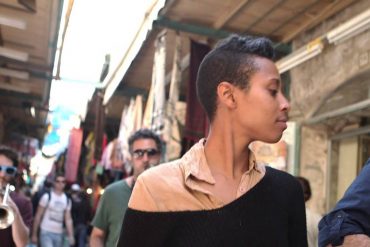h/t Dr CL
The BBC Trust Editorial Standards Committee’s latest publication includes a section which will be of interest to anyone contemplating allocating some of their precious time to making a complaint to the BBC.
On page 75 of that document we learn that the BBC dismissed a complaint concerning an inaccurate statement made by a BBC reporter on the grounds that it wasn’t what she meant to say.
“The complaint concerned the accuracy of a sentence in a news item about an upsurge in violence between Israelis and Palestinians. Speaking about Jerusalem’s Old City and over general pictures from the Old City showing Muslims and Jews going about their day, the correspondent said:
“It’s home to the Al-Aqsa Mosque, sacred to Muslims and Jews.””
That report by Orla Guerin from October 9th 2015 can be found here.
The statement is obviously inaccurate but the BBC’s response to the complaint was as follows:
“BBC Audience Services raised the complainant’s concern with BBC News:
“They note your points and accept that [the reporter] shouldn’t have said that the Al-Aqsa Mosque was sacred to both Jews and Muslims. She meant to say the compound (which includes the Mosque and the Dome of the Rock).” Audience Services said they had nothing further to add and that they did not believe the complaint had raised an issue that justified further investigation.”
Apparently BBC Audience Services also did not see the need for a correction to be made. Unhappy with that response, the complainant pursued the issue.
“The complainant appealed to the BBC Trust reiterating the points he had made. He rejected the explanation given by BBC News, asserting that even as amended it was wrong:
“The … response that [the correspondent] intended to say Al Aqsa Compound is unacceptable. Accuracy demands the description/name used should have been that historically used for many hundreds of years which is extensively documented, as Temple Mount/Noble Sanctuary (al-Haram al-Sharif).”
He said the description the correspondent used was the one favoured by the PLO and was evidence of bias.”
Readers will no doubt recall that in November 2014 the PLO put out a ‘media advisory’ document (since removed from its website) instructing foreign journalists to use the term “Al Aqsa Mosque compound” instead of what was described as the “inaccurate term” Temple Mount.
The BBC Trust Adviser advised against the complainant’s request for a review on the following grounds:
“The Adviser took the following factors into account:
- the BBC said that the reporter had used the wrong wording: it was a slip of the tongue and not intentional
- this was a passing reference to one of the flashpoints in the ongoing conflict
- the majority of the report concentrated on a number of incidents – which had occurred elsewhere in Jerusalem and the occupied territories – and speculated that “lone wolf” stabbings of Jewish civilians might be the beginning of a third intifada
The Adviser reached her decision for the following reasons:
- whilst the statement, that the Al-Aqsa Mosque is sacred to Jews, was incorrect, the audience would not have taken the statement literally and would have been unlikely to conclude that a mosque was sacred to Jews
- the main point of the reporter’s reference here was to communicate to the audience that the area was sacred to both Judaism and Islam
- this was achieved using unambiguous language which stated simply that it was considered sacred to both religions: neither view was favoured over the other, they were both given equal weight
- the Al-Aqsa Mosque is situated very close to, and on the same raised platform as, the Dome of the Rock (under which the ruins of the two Jewish temples are assumed to be buried – although there was ongoing debate about this) [emphasis added]
- the audience would not have expected nor needed more details on this point in order to reach an informed understanding about the main focus of the programme
- the audience were not therefore likely to have been misled on a material fact.”
One can only hope that the bolded statement above does not suggest that the BBC subscribes to or accommodates the narrative of ‘Temple denial’ propagated by some PA officials and others.
The complainant then appealed that decision by the Adviser and an ESC panel subsequently rejected his appeal.
“Trustees agreed that if they took this matter on appeal they were not likely to uphold a breach of the Editorial Guidelines given that:
- the BBC had said it was the wrong wording, i.e. that it was inaccurate
- an apology was given. The BBC had said “we’re sorry for this error”
- the matter had been resolved. […]
Trustees decided not to take the appeal, on the basis that it would not be appropriate, proportionate or cost-effective since there was no reasonable prospect of the appeal succeeding.”
Surely the most cost-effective way of dealing this complaint would have been for the BBC to issue a prompt correction nine months ago when the clearly inaccurate statement was made. Nevertheless, the valuable lesson we learn from this case is that what a BBC journalist later claims to have meant to have said – but didn’t – is grounds for the rejection of a straightforward complaint concerning an obviously inaccurate statement.
Is it really any wonder that members of the public find the BBC complaints system so ‘through the looking glass’ frustrating?
Related Articles:
Orla Guerin tells BBC audiences Al Aqsa Mosque ‘sacred to Jews’
Disturbing themes in BBC coverage of the wave of terror in Israel




